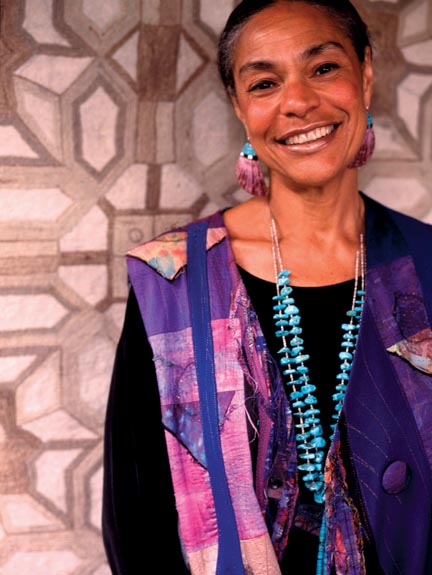PROGRAM
Jonathan Fanton, FDR Visiting Fellow and Interim Director of Roosevelt House, continued his series of conversations with fascinating public figures with educator, researcher, author, and public intellectual Sara Lawrence-Lightfoot, MacArthur prize-winning sociologist and Emily Hargroves Fisher Professor of Education at Harvard University.
SPEAKERS
Sara Lawrence-Lightfoot Emily Hargroves Fisher Professor of Education at Harvard University
Sara Lawrence-Lightfoot, a MacArthur prize-winning sociologist, is the Emily Hargroves Fisher Professor of Education at Harvard University, where she has been on the faculty since 1972. An educator, researcher, author, and public intellectual, Lawrence-Lightfoot has written ten books, including including Balm in Gilead, The Third Chapter and her most recent work, Exit: The Endings that Set Us Free.
Lawrence-Lightfoot is a member of numerous professional and scholarly committees and boards of directors including: The American Philosophical Society, The National Academy of Education, Bright Horizons, The Coalition of Educational Success, WGBH Educational Foundation, The Berklee College of Music, and the Atlantic Philanthropies where she is Deputy Chair. Lawrence-Lightfoot has been a Fellow at the Bunting Institute at Radcliffe College and at the Center for Advanced Study in the Behavioral Sciences at Stanford University. In 1984, she was the recipient of the prestigious MacArthur Prize, and in 1993 she was awarded Harvard’s George Ledlie Prize given for research that makes the “most valuable contribution to science” and “the benefit of mankind.” In 1995, she became a Spencer Senior Scholar; and in 2008, she was named the Margaret Mead Fellow by the Academy of Political and Social Sciences. Lawrence-Lightfoot has been the recipient of 28 honorary degrees from colleges and universities in the United States and Canada.
In 1993, the Sara Lawrence-Lightfoot Chair, an endowed professorship, was established at Swarthmore College and, in 1998, she was the recipient of the Emily Hargroves Fisher Endowed Chair at Harvard University, which upon her retirement will become the Sara Lawrence-Lightfoot Endowed Chair, making her the first African American woman in Harvard’s history to have an endowed professorship named in her honor.
Jonathan Fanton FDR Visiting Fellow and Interim Director, Roosevelt House
Jonathan Fanton is a Franklin D. Roosevelt Visiting Fellow at Hunter College and was President of The MacArthur Foundation from 1999-2009. Mr. Fanton holds a Ph.D in American History from Yale University where he taught and was Chief of Staff to President Kingman Brewster. He was Vice President of Planning at The University of Chicago and for 17 years was President of The New School for Social Research.
He is author of Foundations and Civil Society, Volume I and II (2008), and The University and Civil Society, Volume I and II (1995, 2002).
RESOURCES
- Exit: The Endings that Set Us Free (via NPR)
“Exits are ubiquitous; long or short, grand or modest, we’ve all left something, from resigning from a long-held position to waving goodbye to a friend after lunch. In Exit: The Endings That Set Us Free, author Sara Lawrence-Lightfoot explores endings through the stories of people in transition.” – NPR
- The Third Chapter (via Macmillan)
“In this singular book, Sara Lawrence-Lightfoot introduces a new stage of life, delineates its intriguing and unexpected contours, and draws lessons that are meaningful for every human being.” — Howard Gardner, author of Good Work: When Excellence and Ethics Meet
- Balm in Gilead (via Goodreads)
“In telling the story of her mother, Margaret Lawrence, one of the first black psychoanalysts, Lightfoot, professor at the Harvard Graduate School of Education, charts a generational history within the parameters of the racial history of the United States. Brought up in the early years of this century in strictly segregated Mississippi, Lawrence was sent to Harlem to complete high school. There, and later at Cornell, where she was the only black undergraduate, and at Columbia University Medical School, she experienced a more subtle but equally noxious racism. Until she retired from Harlem Hospital at age 70, Lawrence spent most of her working life in or near New York City, assisting Benjamin Spock and others in pioneering therapeutic services for children. Beginning with her grandmother, a strong line of women supported her. As related here to her daughter, Lawrence’s recollections of these women and their place in the black culture of their day, which was also governed by color of skin and gender, make this a candid illumination devoid of rancor.” – Publishers Weekly
- Balm in Gilead (NYTimes Book Review)
‘In writing ”Balm in Gilead,” Sara Lawrence Lightfoot constantly found herself testing the ”boundaries between daughter, inquirer and narrator.”
”It can be very hard to talk to one’s mother – there is such intimacy and the relationship is so deep,” Ms. Lightfoot said in a telephone interview from her home in Cambridge, Mass. ”We have a relationship that allows both for autonomy and intimacy.”’ – H. Jack Geiger, NYTimes








